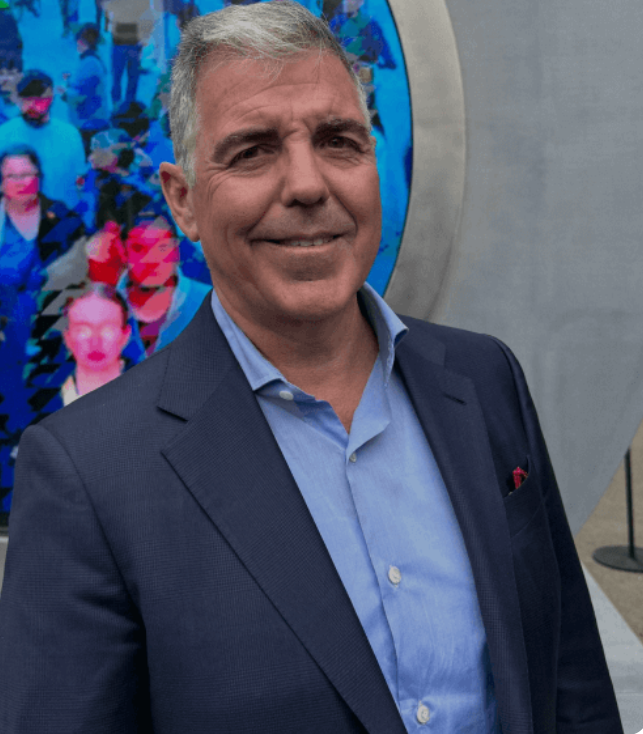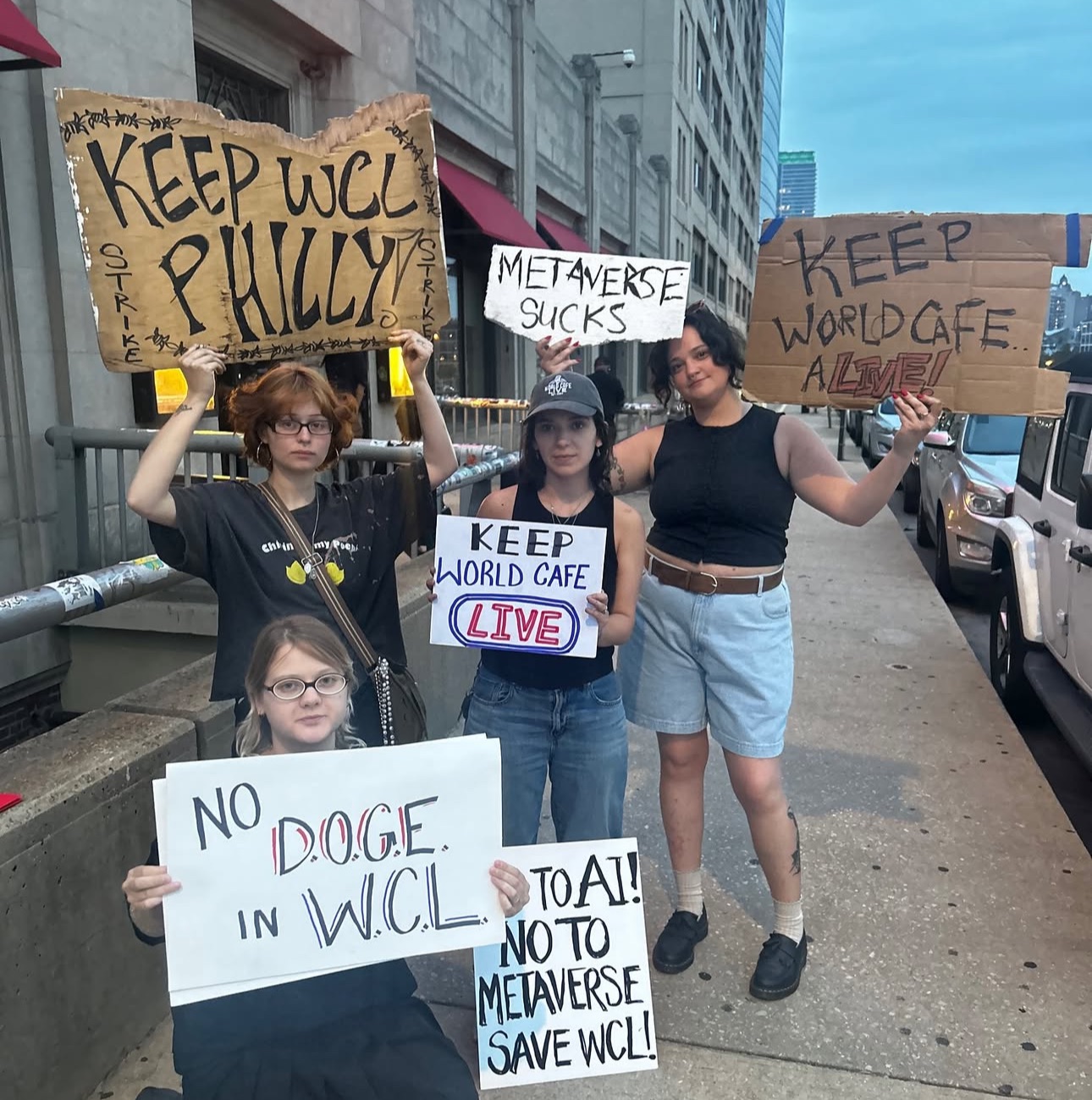Joe Callahan thought he was embarking on a philanthropic rescue mission when he took over World Cafe Live. Never did he anticipate becoming the center of a public labor strife.
A cultural landmark of the city, World Cafe Live (WCL) is a nonprofit independent live music venue in University City. Due to a $6 million debt, WCL was on the verge of shutting down.
Joe Callahan, the current CEO, stepped in to steer the sinking ship, but a clash of management style and workplace culture led to an employee walkout mid-concert, days of protests, and a tense online battle between new management and former staff.
“ I've been in the service industry for 28 years — I've never seen anything like this,” said Mike Stiltner, the venue’s former bar manager.
Where it all began
WCL was established in 2004 by former CEO Hal Real. The venue is shared with WXPN, the public radio station supported by the University of Pennsylvania. Though they are separate entities, Real’s vision was to have a live venue associated with a radio station for the discovery of new experimental artists.
In addition to featuring live music, the venue also contains a restaurant and a bar, where patrons can grab a drink or a meal at The Lounge while attending a concert.
“Just from a mission perspective, it’s really unique in that it’s a nonprofit, it's a music venue, it’s a restaurant and a bar,” said Chris Dreyer, an audio engineer. “Up until I was fired, I was very pleased to work there and be a part of the culture.”
WCL is an institution beloved by both patrons and employees. Novalee Wilcher, a former box office coordinator, attested to the strong workplace culture that made WCL feel just as much like a tight-knit community as it did a job.
“Because it’s a music venue, it attracts cool people,” said Wilcher, who has since been terminated. “Light-hearted, interested in the arts…lots of chit-chatting and messing around with each other, just a lot of fun. It wasn’t perfect, a job’s a job, but I always felt comfortable.”
Still, as of the Fall of 2024, WCL was on the brink of closing. Despite bringing in $5 million in revenue, WCL was losing about half a million dollars each year.
Real had staved off financial trouble during the pandemic by lobbying congress to support live music venues. In 2020, Real co-founded the National Independent Venue Association, a national trade association that was influential in securing more than $16 billion in federal relief for the live entertainment sector.
About $3 million of those funds came to WCL, yet it was not enough to prevent the venue’s mounting debt. Leveraging the connection with WXPN, Real had asked the Annenberg Center — Penn’s hub for performing arts — for additional support, but they declined. Real was on the verge of foreclosing on his second home in North Carolina because of the dire financial situation.
A fresh CEO
Here entered Callahan. Born and raised in North Philly — with a stab wound scar to prove it, he said — Callahan has a background in tech, serving previously as CEO for Ciright and Sansar.
 World Cafe Live CEO Joe Callahan in front of The Portal, which he helped bring to Philadelphia (Credit: Callahan's LinkedIn page)
World Cafe Live CEO Joe Callahan in front of The Portal, which he helped bring to Philadelphia (Credit: Callahan's LinkedIn page)When members of the board of directors were concerned about the financial health of WCL, they started reaching out to industry leaders in the city for guidance on finding a way to keep the doors open. Callahan was tabbed last winter because of his business acumen.
After all, he was the businessman who brought The Portal to Philadelphia last year after investing in Portals.org and becoming one of the directors guiding the global deployment of The Portal.
Upon hearing that the venue could not pay the year’s 401(k) plan, he immediately gave a $25,000 donation on the phone. Later, when he heard payroll couldn’t be made, he donated another $50,000. He has funneled even more of his own money into the venue since.
By April, Real retired, and Callahan took over as CEO.
“Stepping into a leadership role, it was immediately identified that there was financial concern for the sustainability of the enterprise,” Callahan said. “Financial concern based on the revenue streams, based on the costs, and the extreme inefficiencies with how cash is managed in the business.”
In order to save WCL, Callahan planned to create mass fundraising efforts and bring a digital revolution. He aimed to implement digital streaming technology, spatial computing, and virtual reality to globalize the venue.
Callahan also launched a review of the organization’s financial records to trace the source of the reported half-million-dollar loss.
Forensic accountants have since been brought in to investigate whether there was any prior criminal mismanagement of funds. Investigations are still ongoing.
Many of the former management team resigned last month, including COO Kerri Park. Only four of the 16 board members remain. However, some members of the current leadership allege that resignations occurred because of investigations into the venue's previous handling of finances.
New board members have been appointed. Callahan said the plan is for the board to expand beyond 16 members.
A shift in management style
Not all employees were aware of the venue’s financial hardships, but those who did were initially excited for Callahan’s new leadership. One such employee was Stiltner, who resigned June 23.
“When we first met Joe, I was kind of excited because I understood that we were in financial trouble,” Stiltner said. “I didn't know how much financial trouble, but being the bar manager and doing all the ordering, I could tell by looking at the sales. I thought if he just came in and brought in some control, put some systems in place, that'd be great.”
However, many employees found the transition to be disorienting. While they knew new management had taken over, most had no information about Callahan beyond what they could find by Googling his name. Some staff members didn’t formally meet him until more than a month into his tenure. Former employees noted that new leaders frequently appeared at the venue without introducing themselves, contributing to an atmosphere that felt impersonal and, at times, hostile.
“[Callahan] had never really been a patron, and none of the people he was bringing in had ever really been guests,” said Wilcher. “So we didn’t know if they knew what our venue was all about.”
 A concert inside World Cafe Live (Credit: World Cafe Live)
A concert inside World Cafe Live (Credit: World Cafe Live)Since WCL was in such financial trouble, Callahan and his new leadership wanted to make big changes to save the venue. Yet, to the WCL staff who had established operations, they felt such moves veered into adversarial territory.
“ They came in with this arrogance, thinking they knew everything,” said Stiltner. “They never tried to learn our systems or learned what we do.”
Those systems, though, may not have been the best business practices, according to the new management.
Three individuals with close ties to WCL, whether through board membership, operational involvement, or prominence in Philadelphia’s music scene, were granted anonymity by Philly Daily to speak freely about the venue’s past practices.
They alleged that some artists were paid in cash immediately after their performance.
Other allegations included "volunteers" being paid thousands of dollars for their supposedly donated time; a consistent trend of freebies, including comped tickets and lots of alcohol to regulars that was on the house; and cash bonus payments to employees to clean up after patrons who may have had too much to drink known as "vomit pay."
Which is why, once Callahan came on board, he felt that things needed to change. And he wasn't alone in that thinking.
Jeffery Nix, a composer and entertainment personality known as “Yameen All World,” is a board member of WCL. He has been a staple of the Philadelphia music community, especially in the hip-hop scene, for decades. A composer, record producer, songwriter, dancer and turntablist, he has worked on projects with artists such as Questlove, Jill Scott and D.J. Jazzy Jeff, among many others.
Nix said the uncertainty of change may have contributed to many of the employees' gripes with the new management.
“They were used to things being done a certain way,” said Nix. “But, when you have people that are coming in to make a change, you might not be ready for that change. The tone of voice might not be familiar to you.”
Talk of Callahan wanting to bring digital innovations to WCL also sparked anxiety amongst the staff. Many felt that this concept was Callahan's way of replacing them. However, Nix said that was not the case.
"This isn't going to delete jobs, this is going to increase jobs and opportunities for people," Nix said. "Think about it. There are people who aren't able to make it out to a venue but have an opportunity to experience a concert from where they are in real time.
"Not only that, it's another source of revenue for the artist. And people are experiencing World Cafe Live — let's make that a destination, also."
From confusion to confrontation
Still, uncertainty abounded, and it was not until the first all-staff meeting in early June that everyone finally met their new CEO. Callahan said he introduced himself, explained his digital roadmap, and then answered questions from the crowd.
Wilcher said the answers the staff received were extremely vague, and that there were no concrete plans. When someone asked who the new management was, Callahan responded, “leaders.” When asked to specify what kind of leaders, Callahan said, “great leaders.”
Arely Pena, the former front-of-house manager, said she asked about the market research Callahan had seen on the Metaverse and the other tech advancements that he was planning to implement. Instead of answering her question, she said that Callahan moved closer to her and stared her down, like he was trying to intimidate her in front of everyone.
After the staff meeting, employees said tensions escalated at the venue. Pena started having panic attacks at work. “You never really knew if someone was going to come at you that day,” she said.
One employee reported that a member of the new leadership team opened their personal mail. Pena added that another employee had a tense phone call with a new leadership member, and shortly after the conversation, was temporarily laid off — supposedly due to a lack of funding.
“But it felt very much like a clear retaliation tactic,” Pena said.
The simmering tension reached a boiling point on pay day, June 10. Wilcher said she and several other employees were typically paid on Tuesdays, but many experienced delays, with some not receiving their paychecks until more than four days later.
Callahan said the delay in pay was only several hours and was only for people who didn't receive direct deposit into their bank accounts. Printed checks that were delivered to the venue were delayed on arrival until later the same day.
Callahan did admit that there was one employee who was supposed to get an increase in their pay rate in their June 10 check that did not happen. But he insisted that it was an oversight and that he offered to make up the error immediately, which the former employees dispute.
However, the delay in payment prompted staff, like Dreyer, to participate in a walkout the following day. As part of their demands, the workers advocated for on-time and accurate pay, full transparency, respect for the staff, job security, and a commitment to local artists.
“It really was a snowball of a lot of stuff,” said Dreyer. “The points that made me partake in it with everyone else were the pay and opening the piece of mail. It didn’t sit right with me, and it felt like the right thing to do.”
That Wednesday, a number of employees walked out during a Suzanne Vega concert, which continued unbeknownst to the disorder happening outside.
Following the walkout, Callahan and his team terminated a dozen of the walkout participants who could be identified, banned them from the premises, and filed a formal complaint with federal authorities.
“We’re a country governed by laws,” said Callahan. “The fact that they walked out and put the enterprise in harm's way, that they significantly damaged the brand through maliciously trying to get a message across…we have to protect the brand to the fullest extent that we can.”
The workers were handed termination letters by colleagues, or they were received by email. While Dreyer said they were aware of the risks going into the walkout, the employees argued that the walkout was considered legal concerted activity protected by national labor laws.
In response to the terminations, employees picketed outside the venue for the rest of the week, hoisting signs that read “No D.O.G.E. in WCL” and “Respect Pay Transparency.”
 Protesters outside World Cafe Live (Credit: @saveworldcafelive on Instagram)
Protesters outside World Cafe Live (Credit: @saveworldcafelive on Instagram)
Several artists canceled their shows at the venue to stand in solidarity with the workers. The former staff launched an Instagram account that now has more than 4,500 followers. They post critiques of Callahan and updates about their efforts, including posts informing patrons about the refund policy for canceled shows.
Venue looks to rebuild while workers push for union
Callahan emphasized that all he wanted to do was save the venue by dragging it out of the trenches of debt. Yet, employees said his management style is what led to their villainous portrayal of him.
“I don’t think we would’ve been opposed to change,” said Pena. “Had that change been communicated to us instead of just sort of pointing fingers, I think we would’ve been very open to it.”
Looking ahead, Callahan remains adamant that the venue will stay open. WCL has begun rehiring staff and is in the process of finalizing a partnership with Drexel that would integrate the venue into the school’s curriculum as an immersive learning environment.
Nix added that he is working with artists to come back to WCL and put on big events after they stopped performing there several years ago because "they didn't feel welcome."
As a part of the digital transformation, WCL plans to create online classes and host mega events with prominent artists that will be live-streamed for a global audience. Patrons can look forward to Battle of the College Bands, Irish Week, Country Week, and more themed events in the coming months.
“We just keep doing what we do, telling our story, and don't connect to the negativity that others are bringing to the table,” said Callahan. “We continue to provide value and service to the community.”
Callahan and the board are hosting a Town Hall on Thursday, July 10 at 5 p.m. They said they are committed to transparent communication and are opening it up to everyone: artists, promoters, employees, volunteers, even union leaders. That's because the current production staff has taken the initiative to try to unionize under the International Alliance of Theatrical Stage Employees.
.jpeg) An invitation to a Town Hall to discuss what's happening at World Cafe Live amid the labor turmoil that took place last month. (Credit: World Cafe Live)
An invitation to a Town Hall to discuss what's happening at World Cafe Live amid the labor turmoil that took place last month. (Credit: World Cafe Live)
Many former employees are still reeling from the situation.
“We would all show up to work every day and deal with the challenges,” said Pena. “It’s a challenging industry, but we were there because we loved it. We’re all very heartbroken about this.”